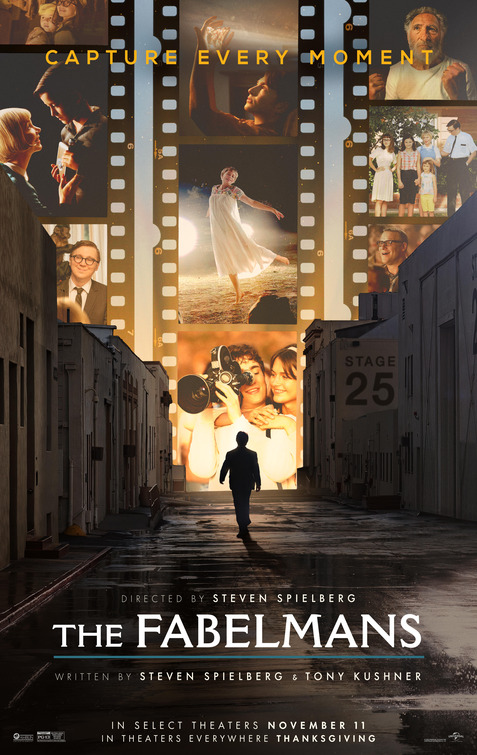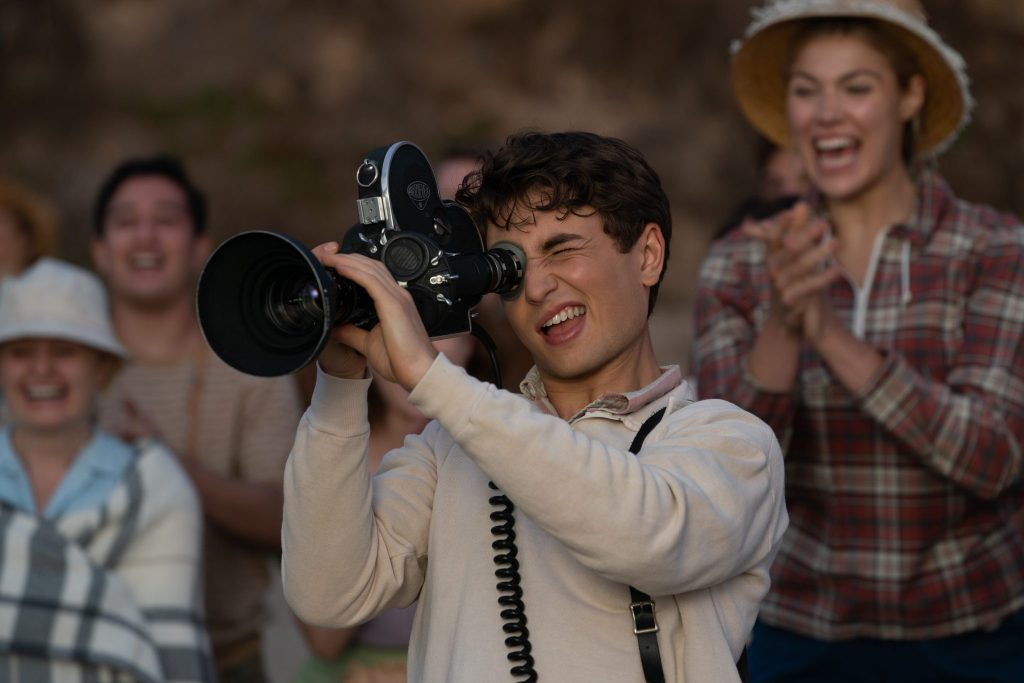
The most basic (and oft-repeated) piece of writing advice is “Write what you know.” When directors hear that, it translates to “make a movie about your childhood.” It seems to work. Woody Allen (Radio Days), Barry Levinson (Avalon), Richard Linklater (Boyhood), Greta Gerwig (Lady Bird), Alfonso Cuarón (Roma), and Kenneth Branagh (Belfast) have all taken the advice to heart and delivered superior work. Now Steven Spielberg has entered the fold and created a beautifully realized portrait of his formative years.
The Fabelmans defies easy categorization. The chronicle of the director’s life from ages 7 to 18 features a screenplay with frequent collaborator Tony Kushner (Munich, Lincoln, West Side Story). The narrative is basically a coming-of-age tale that begins with a memorable experience. Sammy Fabelman (played by Mateo Zoryan at first, then Gabriel LaBelle) falls in love with cinema after witnessing the spectacular train crash in Cecil B. DeMille’s 1952 circus drama (and Best Picture winner) The Greatest Show on Earth. The spectacle has such a profound impact on him that he re-creates it with his Lionel electric train set. Unfortunately, his numerous attempts break the toy. So his mom gives him a movie camera and suggests he record the event so he can watch it over and over.
It’s the perceived authenticity of these reminiscences that captivate the viewer. Seeing the depth of Sammy’s creativity and the admiration he incurs for his directorial efforts is so exciting. His appreciation for motion pictures develops with the early productions he helms. Sammy’s early actors include his sisters Reggie (Julia Butters), Natalie (Keeley Karsten), and Lisa (Sophia Kopera). In one, they’re riding on a stagecoach. In another, he wraps the girls in toilet paper to be mummies for a horror picture. He directs a western while in the Boy Scouts for his photography merit badge. His abilities are growing more skillful and adept. Later, his war movie receives a warm reception from the entire troop and their families.
What commences as a chronicle documenting the seeds that inspired his passion for film morphs into a deeper portrait of his family. Life isn’t all smooth sailing. His film of a camping trip will expose a devastating truth. Spielberg has cast these personalities with an eye for charismatic people. Newcomer Gabriel LaBelle is a likable presence that suggests the director as a teen in temperament and looks. Michelle Williams as mother Mitzi has garnered significant praise for her performance. She is a kooky individual that demands to be the center center of attention. As a concert pianist, the clickety-clack of her fingernails can be heard when she plays the piano. This talent is sidelined to raise her children. Her decision to put Sammy, Reggie, and Natalie in the car and drive toward an oncoming tornado implies eccentricity verging on undiagnosed mental illness. In contrast, Paul Dano is his straight-laced father. Burt is a successful electrical engineer who hopes his son will follow in his dependable footsteps.
The social dynamic is particularly engaging around the dinner table. Here the clan eats off paper plates and uses plastic utensils on a disposable tablecloth. (Mitzi hates doing dishes). She cleans the table by grabbing the four corners of the covering in one fell swoop. His grandmother Hadassah is slightly annoyed but tolerates these shenanigans nonetheless. Jeannie Berlin stands out in that small part. Seth Rogen is his Uncle Bennie, who is really just his father’s best friend, and Judd Hirsh portrays his jaded Uncle Boris. He’s a black sheep who shows up unannounced and delivers his unvarnished view of Hollywood. Boris paints the industry as a struggle between art and family, and his rant is intense.
As with any cinematic depiction of one’s life, there’s an expected blend of fact and fiction. This is a “semi-autobiographical” story, so not everything rings true. However, it’s hard to tell what’s real and fake. Sammy grows up in an Orthodox Jewish family. He’s embarrassed by how their dark house stands out as an undecorated eyesore during the Christmas holidays. After moving from Phoenix to California with his family, he attends high school in an affluent Bay Area suburb. Tensions arise. Being Jewish and terrible at sports makes him the target of two bullies. Jocks Logan (Sam Rechner) and Chad (Oakes Fegley). The worlds of socialization and art collide when he is tapped to record the “Senior Ditch Day” at the beach as a fellow senior. His document makes an indelible impression on his peers, and one in particular. Despite his outsider status, he meets Monica Sherwood (Chloe East), who takes a liking to him. She is a Christian girl who tries to convert Sammy to accept Jesus as his savior. The methods she uses do strain credulity, but they are amusing. Oh, and at one point, a random aside details the day his mom comes home with a pet monkey.
Steven Spielberg lovingly reflects on the childhood that shaped him. The art of filmmaking and the complicated relationship between his parents intertwine in this fascinating saga. There’s no question that Spielberg is a master storyteller. The filmmaker has honed his craft since the early 1970s. Think of The Fabelmans as a gymnastics routine. The vignettes are like a series of leaps and turns. They seize the viewer’s focus like the choreography of impressment movements. Perhaps The Fabelmans most memorable and authentic moment arrives at the end with the meeting with a famous director. That scene truly sticks the landing.
11-23-22


7 Responses
This did not disappoint. I really enjoyed looking into what inspired him to be a great director. Some parts were iffy, but over all. I was all in. 4 1/2 ⭐️
Yeah, one of the best of the year. It has gone largely unnoticed in theatres (less than $4 million so far), but when Oscar nominations are announced, that could change.
Do you know why Spielberg chose the name Fabelman for the movie? Is that his real name?
No. Steven Spielberg is his real name. Co-writer Tony Kushner came up with the title. In his words: “I’ve always liked the German word ‘fabel,’ which means fable. And because the movie is autobiographical for Steven, but it isn’t an autobiography, it’s not a documentary, so there’s a fictional element as well. So I thought that ‘Fabelman’ was a nod to that.”
What I want to know is, what became of the guys that wrote the script up through the Judd Hirsch scenes? The producer should’ve paid them whatever it took to stay on and do the rest of the film.
I didn’t notice a decline in quality. What did/didn’t you like?
I thought it sort of stuck out. The early stuff had subtle touches of a sort that made the characters come alive, like they did in Christmas Story, say, or E.T. The dialogues with Mom were a bit over-calculated and stagy, but they injected some drama into a story that needed it. But what went on at the high school! Gee whiz, I kept expecting Mr. Miyagi to show up and help the Cinema Kid overcome all those dopey Christians: not to Spielberg standards in my opinion.